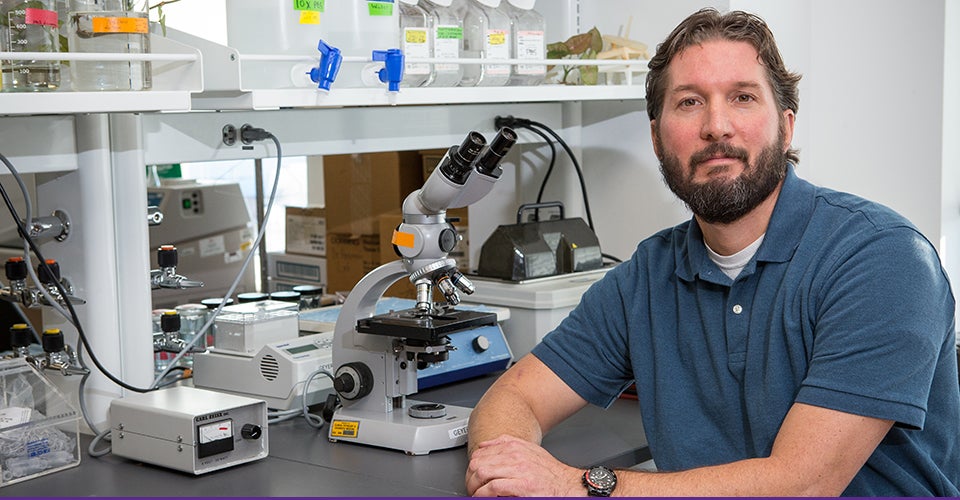DELICATE BALANCE
Research targets sperm cell development
Throughout a decades-long reproductive lifespan, the human male body maintains a delicate balance related to sperm production that has direct public health implications related to both infertility and testicular cancer.
And a research team at East Carolina University has received a $438,076 grant from the National Institutes of Health (NIH) to continue studying the mechanisms by which that balance is maintained.
“My lab studies spermatogenesis, the process that results in the production of sperm,” explained Dr. Christopher Geyer, assistant professor in the Brody School of Medicine’s Department of Anatomy and Cell Biology, who is spearheading the research.
“The body maintains a balance of spermatogenic cells, some retaining stem cell potential and others on their way to becoming sperm cells,” Geyer said. “These stem cells are what make men fertile for most of their lives. We’re working to further the understanding of gene regulation and the manner in which disruption of the normal pattern can lead to abnormalities, including infertility and testicular cancer.”
Men have become fathers as young as 11 years old, and others have fathered children in their 90s. By contrast, women begin their lives with a finite supply of egg cells, and fertility declines in the 30s and 40s.
“The consistent production of sperm is ensured by this stem cell supply, and there has to be a balance between maintaining this supply and producing this huge number of cells that will become sperm. The body produces something like 1,000 sperm per heartbeat,” Geyer said.
The stem cells retain the potential to develop into different types of cells. The research project focuses on the processes by which some cells begin the process of becoming sperm, while others remain as stem cells. The balance is vital, he added, because if the cells divide out of control, it can lead to testicular cancer; too far in the other direction results in infertility.
“We really understand very little about the processes by which these cell fate decisions are made,” Geyer said. His team is studying the role of retinoic acid in the process and working to identify the critical requirements for differentiation and sperm production to take place.
“Approximately 10 percent of American couples have fertility issues, and about half of that is on the male side. And that has been increasing over the last few decades,” Geyer said. “Understanding these processes will hopefully help us slow that decline.”
Department chair Dr. Cheryl Knudson said Geyer’s research is important for several reasons, not the least of which is the potential impact on public health.
“This NIH grant will contribute to the mission of ECU by strengthening biomedical research here at the Brody School of Medicine and providing students the opportunity to be involved in a stimulating research project,” she added.
The grant, administered by the Eunice Kennedy Shriver National Institute of Child Health and Human Development, is a renewal of a three-year, $432,837 grant awarded in 2012.
Geyer came to ECU in 2010 after a postdoctoral fellowship at the National Institute of Environmental Health Sciences.
NIH is a federal agency that seeks to enhance health, lengthen life and reduce illness and disability by investing in medical research. In 2015 the associated institutes awarded more than $20 billion in research grants. The NIH database currently shows 37 research projects at ECU funded by active grants.
